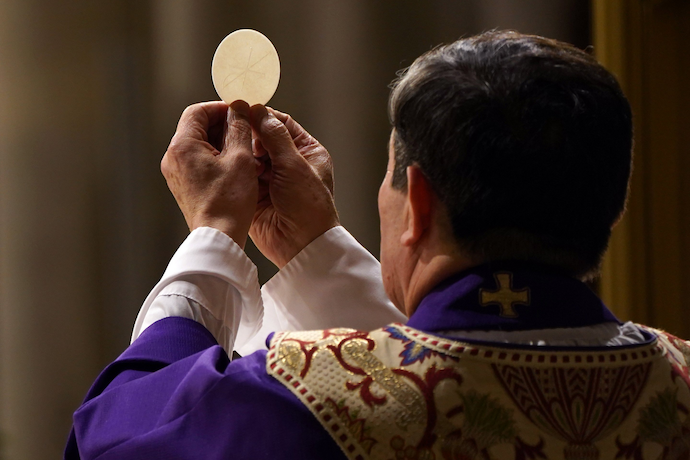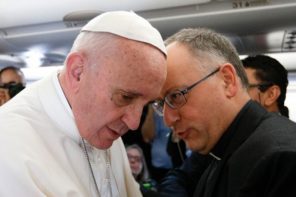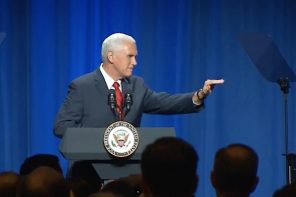I hate to say “told you so,” but the opportunity comes along so infrequently I feel obliged to take it when I can. The plan among U.S. Catholic bishops to bludgeon Pres. Biden with a statement on the Eucharist that would highlight his unworthiness to receive has flopped, more or less as I predicted.
Contrary to the New York Times, I never thought this was an effort to deny Biden communion itself. As the Times and any other intelligent observer knows, the U.S. Conference of Catholic Bishops can’t set policy for the reception of sacraments. That’s done by the bishops in their respective dioceses, and carried out (sometimes not) by individual priests presiding in worship. Certainly no one understands better than the members of USCCB the limits on their power to excommunicate. Not even Cardinal Chaput would think they could bar POTUS from receiving in his home parish.
So what gives? It was a symbolic shot across the bow, I think.
To understand it fully, you have to set aside the framework of partisanship for a moment. The bishops have certain causes or priorities that they care about: abortion, of course, and shoring up what they understand to be the ‘traditional’ family, but also poverty and immigration. There are others, but those are the main ones. That agenda doesn’t fit neatly with either party. The bishops are well to the right of most Democrats on social issues, but to the left of Republicans on poverty and immigration.
On social issues, the bishops all seem to be more or less on the same page: abortion bad, same-sex marriage bad. There’s apparently more room for disagreement around economic questions. They all seem to agree that a responsible social safety net is a good thing, and beyond that there’s some diversity in viewpoint. Same with immigration: they all believe that immigrants should be treated with dignity and respect. After that, there are a lot of different views. But where you get the real differences is in priorities. What’s more important: abortion or immigrant rights? Most bishops would try to say “both, equally” but you have to start somewhere. So which gets the most emphasis? Not surprisingly, some bishops prioritize sexual issues, and some come down on poverty and immigration.
Keep that in mind as we consider the bishops’ current position: taking stock of a new president, and trying to decide how they want to work with him. Again, not surprisingly, it’s a bit of a mixed bag every time someone new is sworn into office. They loved Trump’s stance on abortion and GLBTQ rights (no and no, respectively). They were less thrilled with his stance on immigration (also: no).
Conversely with Biden, they like where he’s at with immigration and poverty. It seems like the church is a little more tentative about vaccination, but they believe it’s a good thing in the end. But Biden’s clearly not on the same page as they are on the sexual issues, and this presents them with a particular problem. It’s one thing to have someone like Obama to disagree with: he comes out of some crazy sect they’re not even sure is Christian.
But Biden is a Catholic through and through. For many of the bishops, this is a real problem. Any pol who bucks their teachings is a problem, because it diminishes their authority. But a sitting president? That’s an embarrassment, and bishops do not like being embarrassed. Archbishop Cordileone of San Francisco said it pretty directly:
[Cordileone] said bishops would not be taken seriously if they did not create the communion document. “Our credibility is on the line,” he said. “The eyes of the whole country are on us right now.”
There’s some incentive for the bishops to take a tough line with Biden, in other words. They’ve painted themselves into this weird corner by making abortion the litmus test for Catholic politicians, and they can’t afford to lose face by backing down.
Now, as it happens, politicians also do not like to be embarrassed. Getting rapped on the knuckles by your church really doesn’t help polish your image. They try to avoid that. That’s doubly the case if being a pious churchgoer has been central to your public image for, say, the last fifty years or so.
So here we are, with the bishops taking stock of this new Catholic president, trying to sort out their own priorities, figuring out what kind of working relationship they want to have with him. On the one side, there are people like Archbishops Cupich or Gregory, who say “Let’s look at what we have in common, and work from there.” Those are the people who prioritize poverty, immigration, maybe racism. On the other side, there are people like Archbishops Cordileone or Jose Gomez of Los Angeles, and a bunch of others, the culture warriors, who say “We need to set a boundary here.” That’s the side that won at the bishops’ meeting in June.
It’s a little embarrassing for Biden to have the bishops drafting this statement that might imply that he should not present himself at a communion rail. But the key there is that it’s a little embarrassing. Just a little, not too much. It’s a warning: don’t get ideas about expanding abortion rights, or rights for gays and lesbians. Go too far, and we will try to cut you off.
Was that an idle threat? Probably. There’s no way on God’s green earth the Vatican is going to excommunicate a sitting U.S. President. The Holy See has worked hard to maintain its unusual status as a sovereign nation, and this is the kind of diplomatic incident they don’t want. Indeed, the Vatican issued a warning against exactly this kind of shenanigan, and as E.J. Dionne rightly notes, the bishops’ vote can certainly be interpreted as thumbing a nose at Pope Francis:
It was also an attack on Pope Francis, who had made clear that he did not want them to go down this divisive road. And it reinforced the suspicions of the church among progressive-leaning young people already alienated from Christian institutions that champion extreme forms of conservative politics.
In any case, just the whiff of a ban is enough to send a firm message. It’s not how I’d want to start my working relationship with POTUS, but then I don’t consider myself a prince of the church.
The conservative bishops were always going to have to walk this one back. The part I got right (and E.J. Dionne confirms) was that the conservatives would try to write something tough as nails, only to run into stiff resistance from the Vatican and their own laity. They’ll wind up releasing something high-minded and abstract about the beauty of the sacrament and first principles and the cause of the ‘unborn’ and the need for church discipline and obedience, dammit—and then everyone will politely ignore it. I suspect that on some level, that’s really okay with the conservative bishops: the vote sent their message just fine.
For the rest of the Catholic church, not so much. As Mary Hunt saw back in May, this stunt paints the bishops as a bunch of hypocrites and undermines what little moral credibility they have remaining:
They reprised it on Inauguration Day with a missive that was largely lost in the hoopla and stood in sharp contrast to Pope Francis’ kind, diplomatic words of welcome to the second Catholic president of the United States. The Bishops acknowledged Mr. Biden’s personal piety, but charged that he “has pledged to pursue certain policies that would advance moral evils and threaten human life and dignity…” They weren’t referring to building walls, supporting the death penalty, interfering with voting rights, and/or withholding healthcare from those made poor. The chorus was a tired refrain: “abortion, contraception, marriage, and gender.” It was as if Catholics cared about nothing else during a global pandemic when systemic racism and economic inequality reign. The timing was rude, the content familiar, the impact minimal.
The Times says this entire sordid little story is a “dramatic show of force by an ascendant conservative movement within Catholicism.” I don’t think that’s right. It seems more to me like the desperate antics of small men whose flocks keep getting smaller all the time. Their instinct is to clutch ever more rigidly to their rules as the churches shrink. It would not be fair to lay the entirety of declining religious affiliation at the feet of conservative church leaders like the bishops, but as Mary Hunt has pointed out many times, the combination of the bishops’ blithering depravity on sexual abuse and their apparent determination to wage holy culture war is a deadly one. They demonstrate over and over to their laity their irrelevance.
When John F. Kennedy ran for president, he had to assure the American public that he would not kowtow to the bishops’ mandates. When Biden was elected, the nation mostly shrugged at his Catholicism, and the stories of his run-ins with the hierarchy barely last a few news cycles. By the time we get a third Catholic president, voters are going to ask “What’s a bishop again, and why do we care what they think?” I’d like to humblebrag and say “Of course, I could be wrong about that,” but as it happens, I have a lot of data on my side.





